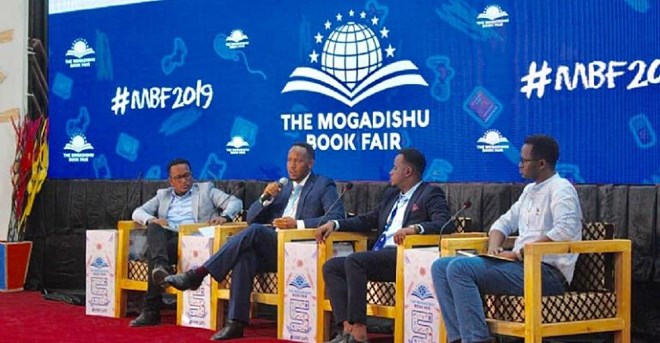Liban Obsiye
Monday 26th August 2019

The Somali Book Fair scene is booming and there is no greater
happiness than people, especially, young people, rushing to attend such
educational events.
It is even more inspiring
that young Somali authors are writing on a large scale about their own
experiences to educate, entertain and raise awareness of key social
issues.
advertisements
Somalis have a proud,
strong and infectious oral tradition but it is a welcome sign that the
next generation are moving towards writing these down. Books can stay on
shelves for centuries while memorized words can easily be forgotten or
misinterpreted. The organizers of the
Somali Book Fairs across the country are pioneers and should be thanked
most sincerely. In amongst the many worries about insecurity, politics,
economic development across Somalia, the organizers and authors have
created a space for thought, reflection and enjoyment that brings people
together.
There’s nothing like a great
book or idea to unify and energize groups with often very different
priorities. Culture, of which books are a fundamental pillar, has the
power to bring out the beauty of mankind in such a magnificent way as to
overpower all other emotions.
Reading
books bring to the fore all human emotions and creates a deep connection
between those in societies who may never have even met. However, for
the delights of reading to be enjoyed on a mass scale, literacy must
improve in Somalia.
Literacy and numeracy
are a global gold standard for education everywhere. For book fairs, the
main focus would be literacy rates because the more people can read in
Somali, English, Arabic and other languages, the more books that could
be written, sold and discussed in public. Ideas can be written in any
language but understanding and appreciating it needs a mastery of one of
these, including Somali.
Despite the
large number of graduates and the steadily increasing number of Somali
students in compulsory education, literacy rates in Somalia are still
dangerously low.
The number which can
write Somali, let alone another foreign language, is limited. This is
because of a weak education curriculum, poor teaching standards and
teaching as well as lack of effective oversight of the education sector.
Another key challenge is the academic
teaching of the Somali language has disappeared and many who write today
write with their local accent because there a few people still alive
who remember the mechanics of the formal Somali language which was
adopted by the past SiadBarre regime in October 1972.
Somali
students who are lucky enough to be able to afford quality education
today may be able to ponder on these ideas but many more are not this
lucky.
Sadly, most Somalis have not had
the opportunity to benefit from education since the collapse of the
Somali state in 1991. The disastrous two decade civil war created an
entire lost generation which is today is illiterate and competing with a
new generation for limited opportunities.
Reading
for those who have not had the opportunity of an education is a
distance dream but it does not mean that they do not and would not enjoy
it.
However, for this to happen we need
to transform reading from an elite pursuit to a common agenda for
community building and national solidarity. How? This is not hard as
education is one of the few policy areas globally where there’s many
agreed good practices to learn from and transfer easily to the Somali
context.
The Ministry of Education and its
international partners that support it with policies and programming
must think practically about how to increase literacy by using
innovative strategies. Early year’s education is agreed globally to be
the most valuable stage of education but getting this good start which
sets students and families up for a life of literacy is costly and
logistically not possible at this time in Somalia given the security
issues.
However, the promotion and support
of local reading clubs, mobile community libraries and the building of
libraries will help to increase literacy in safer areas. In less safer
areas, Somali language radio plays, TV book readings with subtitles and
web based mobile delivered graphic story telling would truly have a
lasting impact on literacy.
These will
also support professional teachers, local publishing, design, IT and
transport businesses and industries which will be the main vehicles for
the innovative literacy policy delivery.
Speaking, listening, reading and reflecting together are great skills that are in limited supply within Somali society.
While
Somalis have a strong oral tradition, improving on listening, reading
and reflecting will further increase literacy and critical thinking to
innovate.
The Book Fairs, including the
recent one in Mogadishu this week, are the start of something positive.
However, we need to build on this with innovative policies that are
designed by the Ministry of Education and implemented at the community
level nationally to increase literacy to turn schools and book fairs
into the engines of sustainable development they can be.
[email protected]
@LibanObsiye (Twitter)